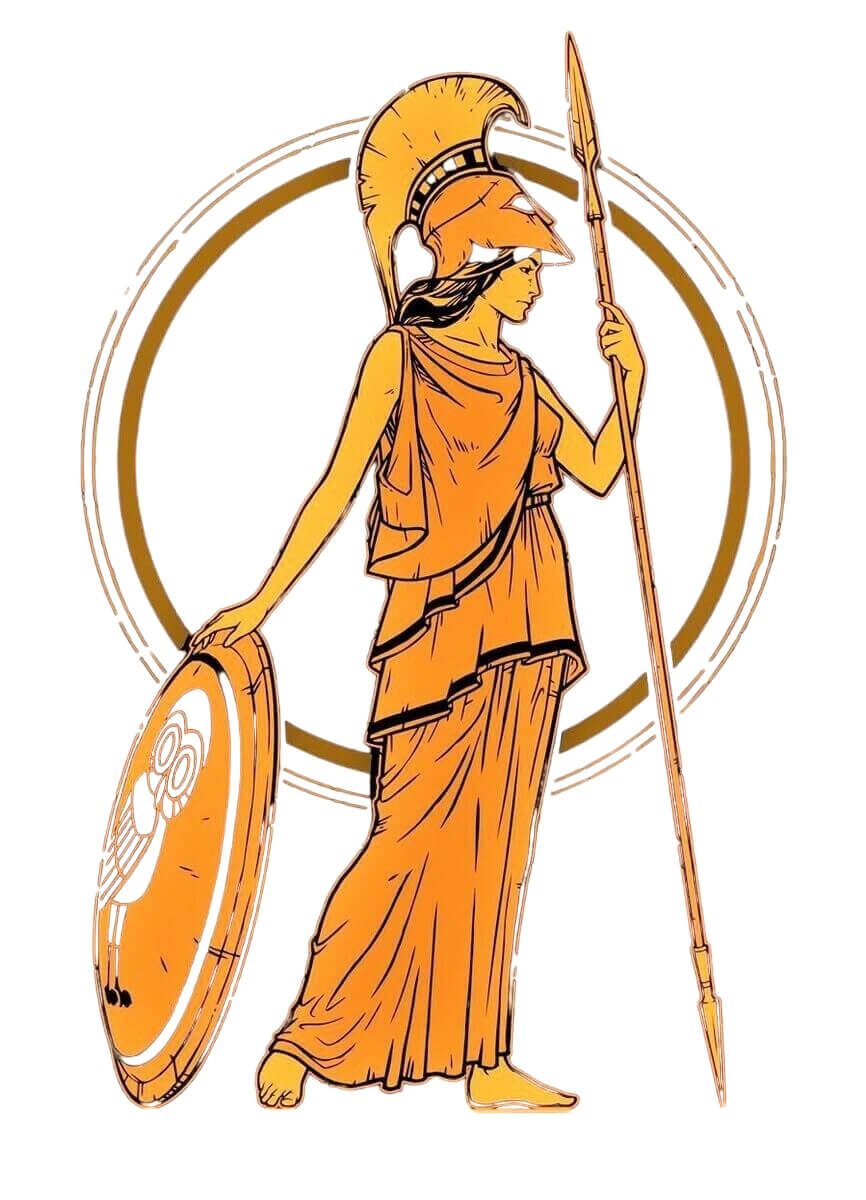Dionysus: Greek god of wine and ecstasy
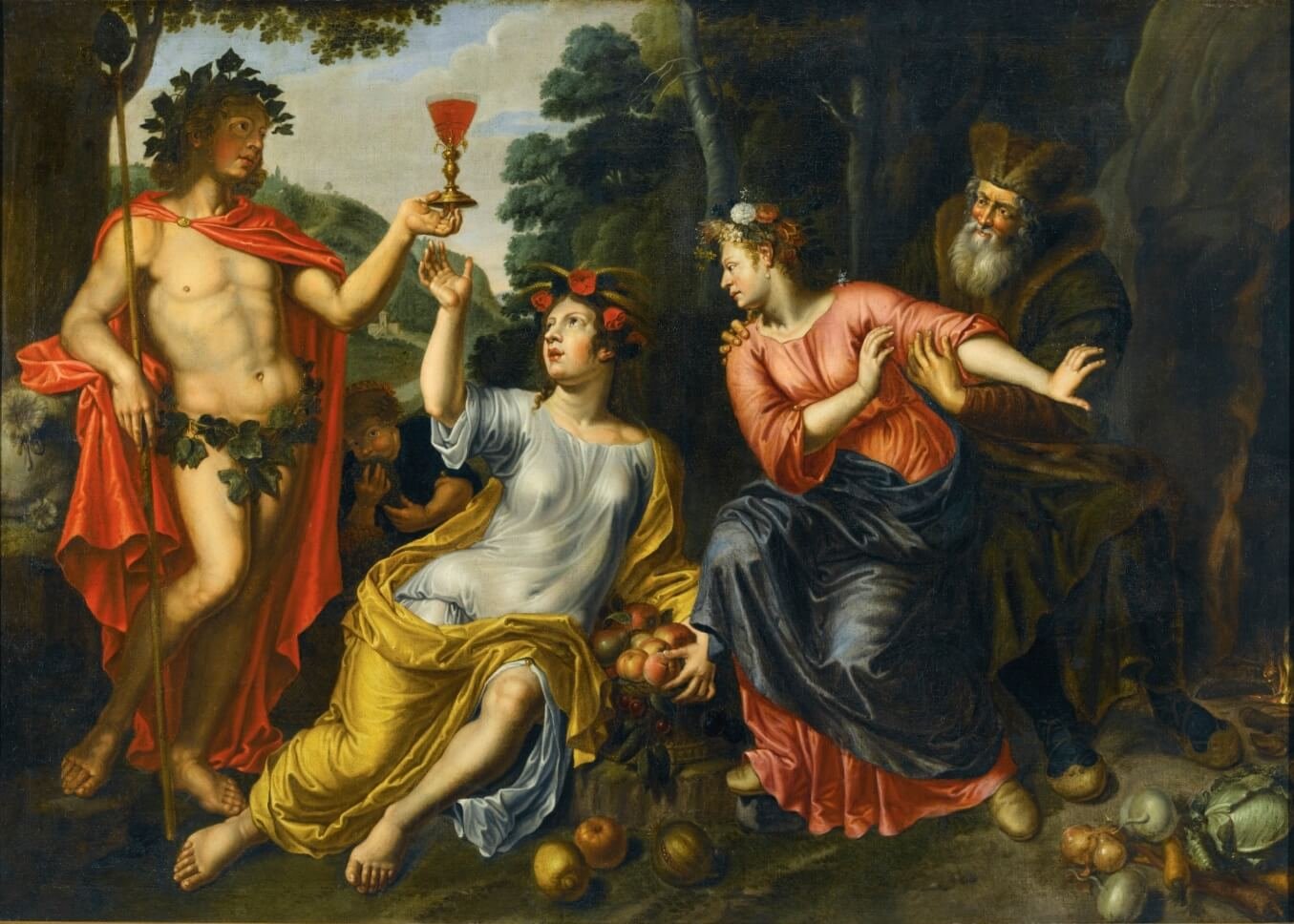
Dionysus was the Greek god of wine, festivity and euphoria, fruitfulness, fertility and vegetation. He was usually depicted in company of maenads – intoxicated, demented youthful women, possessed by ecstasy; and satyrs – humanlike creatures with horns, goat legs, horse tails and covered with wool.
The Birth of Dionysus
Dionysus appeared on Olympus later than other gods. He was the son of Zeus and a mortal woman – the beautiful Theban princess Semele. As usually Hera found out of Zeus’s adultery and decided to take her revenge upon his new beloved. She instigated Semele to discover the real appearance of Zeus; something that would end with her young mortal life. Inasmuch as after having seen the supreme god in his true shape all the mortals were perishing without delay.
Therefore, when Zeus appeared in the rumble of a thunder and the brilliance of lightning, the fire engulfed Semele and she died. The curious woman perished, being pregnant of the supreme god. But as a father Zeus could not allow the death of his unborn son. He snatched the child from the fire, and since the infant was too weak as to live independently, he sewed him into his thigh. Dionysus strengthened in the body of his father and afterwards was born the second time, from the thigh of Zeus. For that reason, the Greeks called the god of wine as “the twice born”.
Thereafter Dionysus could not bear to see his mother Semele in the realm of Hades. When he obtained his worthy place on Olympus, he made a descent into the world of the dead. Afterwards he found Semele and brought her to the shining Olympus. She became an esteemed goddess and was honored under the name of Thyone.
Hera pursues Dionysus
In the meantime, Zeus gave Dionysus to the king Athamas and his wife Ino. She was the sister of Semele, at whose house the little god lived for some time, disguised as a girl. However, even the disguise could not hide him from Hera. Since she was not satisfied with Semele’s death and transferred her hatred to the child. Hoping that the king Athamas would kill Dionysus, she inflicted madness on him. However, he killed only his son Learchus, mistaking him for a deer, meanwhile Hermes saved Dionysus and carried him away.
The god of trade brought Dionysus to the mountains of Lydia, entrusting his care to the titan Rhea, who was supposed to raise him to manhood.
According to another version of the myth the rain-nymphs of the mountain Nysa had raised Dionysus.
The Law and the archons tend to be so much Draconian and unlawful as Hera. They care only about themselves and their own families.
When it’s about someone else like Dionysus, his rights of childhood, birth and freedom can be destroyed and perverted. Dionysus invented the wine – the drink of oblivion, and went aside, far away from the city. His life was full of ecstasy and intoxicating wild celebrations with crazy nymphs and sylvan creatures.
He tried to be the opposite of Hera and stood against her strict way of life. However, his enthusiastic festivity did nothing but confirm the power of despotic law and tyranny. The wine and sylvan madness did not make a revolution.
Dionysus makes drinks
Very soon Dionysus had made his most important discovery. He learned how to make a soul-pleasing drink from the juice of grapes. Therefore, when he grew up, he became a cheerful, powerful god of wine, giving people strength and joy. Wishing to award people with his discovery, Dionysus went around the entire inhabited earth, teaching how to grow grapes and make wine from them. In the places where the grapes did not grow, Dionysus taught people to make another drink from barley – the beer.
The god of wine and Icarius
The first person whom Dionysus gave the wine was a farmer from Athens, named Icarius. He liked the drink and decided to introduce it to other people. That’s when the first tragedy had occurred. The shepherds to whom Icarius offered the wine felt delighted. They had never drunk anything like the wine of Dionysus, thus they drank too much and became intoxicated.
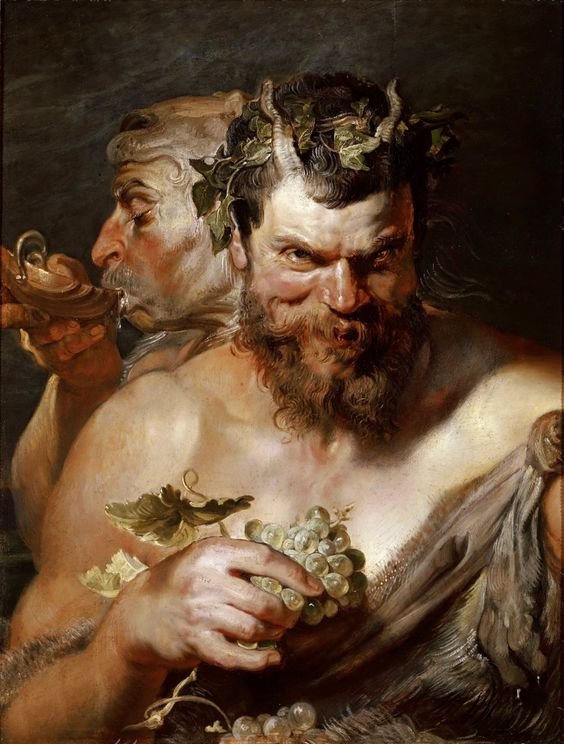
They felt sick and thought, that Icarius had poisoned them. Thereupon they attacked him furiously and killed the farmer. But Icarius had a daughter named Erigone and it did not stop with his only death. When he did not return home, Erigone went in his search with her faithful dog and found him dead. Her grief was so great that she hanged herself from a tree over her father’s body.
Dionysus went into a rage after such a tragedy and decided to avenge Icarius and his daughter. He inflicted madness on the Athenian girls, and they began to commit suicide, just as Erigone had done.
The Athenians asked Apollo about the reasons of the tragedy and he told them that it occurred due to Icarius. Therefore, the Athenians punished the assassins, and inaugurated honorific rites in memory of Erigone and her father. The gods placed Icarius in the sky, as the constellation of Boötes and from this moment on the Athenian misfortune had stopped.
The maenads or Bacchantes
During his wanderings Dionysus was accompanied by a crowd of admirers, not only men but also women. In a wreath of grapes, he was riding a panther, and all around him the maenads performed a riotous dance. The maenads were women who devoted themselves to the service of Dionysus (they are also called Bacchantes, because the roman name of Dionysus was Bacchus.
The maenads held thyrses, long ivy-covered wands like those of Dionysus himself. They dressed in deer skins and girded with strangled snakes. In a holy frenzy they were crushing everything on their path. They were tearing into pieces the wild animals they managed to catch. At the same time from the earth and rocks they carved milk and honey with their wands. On top of that they tore up the trees they had been encountering on their way. Their riotous procession was frequently depicted on ancient Greek pottery and handicraft.
Satyrs
In addition to the maenads, Dionysus was also accompanied by satyrs. They were creatures that looked like humans, but their bodies were covered with wool and they had goat legs, horns and horse tails. The Satyrs behaved mischievously, and lived horribly cheerful and often very drunk. Except for wine and beautiful nymphs, they didn’t show interest in anything else. Accompanying Dionysus all along his journeys, they played simple melodies on whistles and flutes. Thereupon the piercing sounds of their music spread throughout all the neighborhood, heralding the approach of rapture, cheer and intoxication.
Old Man Silenus
Dionysus has an old wise tutor named Silenus. He follows the god of wine everywhere he goes, riding on a donkey and enjoying the fest. He is rather funny looking – bald, potbellied and snub-nosed, and he is always sitting on his mule.
Silenus likes the drink invented by his pupil so much, that no one had seen him sober for a long time. However, he didn’t lose his mind and sometimes he suddenly utters words of wisdom in a perfectly sober voice. Dionysus loves his tutor very much. For that reason the satyrs always take care of him.
Midas
Despite all the precautions, Silenus disappeared one day. Silenus fell off the donkey and remained lying in the roadside bushes. No one noticed his disappearance, and Silenus himself slept peacefully in the place where he fell down by accident.
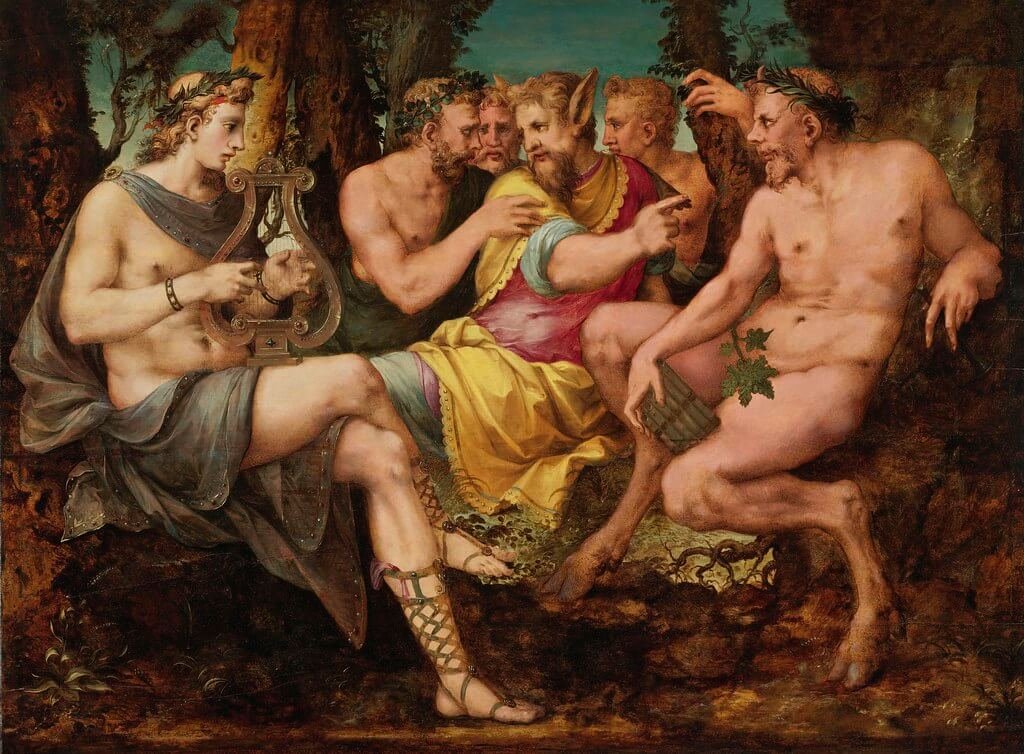
In the morning the servants of King Midas had found him and brought him to the palace. Henceforth the king had immediately realized who stood in front of him, and surrounded Silenus with all kinds of honor and cares. He let him rest a lot, and afterwards helped him out to return to Dionysus.
For this reason, the god offered Midas the opportunity to be rewarded. The king, not being particularly clever or imaginative, asked for the gift to turn everything he touched into gold. Dionysus agreed and accomplished the wish.
Midas felt beyond happy. Now he would become the richest man on earth! He broke a branch from a tree – and the branch in his hands turned into gold. He picked up a stone from the ground and the stone became gold as well. But when the time for the dinning had come Midas felt sick and scared.
He took the bread from the table and it became gold too. Only now the king had realized how terrible was the gift of Dionysus. All the food was turning to gold in his hands, and he was threatened with starvation. Therefore, Midas begged Dionysus to take back his award, and the god of wine, agreed without angriness. He commanded him to go to the river Pactolus and bathe there in order to wash away the magic power. Midas did so, and after having bathed in its waters he was able again to touch everything with security. Insofar as the objects were no longer turning into gold.
As a result of such an adventure, people began to find golden sand in the waters of Pactolus. Insomuch as Midas had transformed the part of sand into gold by the time of his bath.
Dionysus takes revenge on Agave and Pentheus
Semele, the mother of Dionysus had a sister, named Agave. When she died, sizzled by Zeus’ lightning, Agave began to say that Semele perished deservedly. She spread rumors, saying that her sister was honored by Zeus himself, and as a punishment he destroyed her. Pentheus, the son of Agave, who became king of Thebes said the same kind of lies.
He told in addition that there isn’t such a god as Dionysus, and all his story is a vain fiction. That being so, Dionysus himself decided to stand up for the honor of his mother. Thus he adopted the shape of a beautiful young man and appeared in Thebes in order to take revenge. He infected Agave and other women of the city with Bacchic frenzy. Immediately afterwards they turned eccentric and mad. They praised Dionysus with frantic wild cries and fled to the mountains in order to live as frenzied maenads.
Dionysus before Pentheus
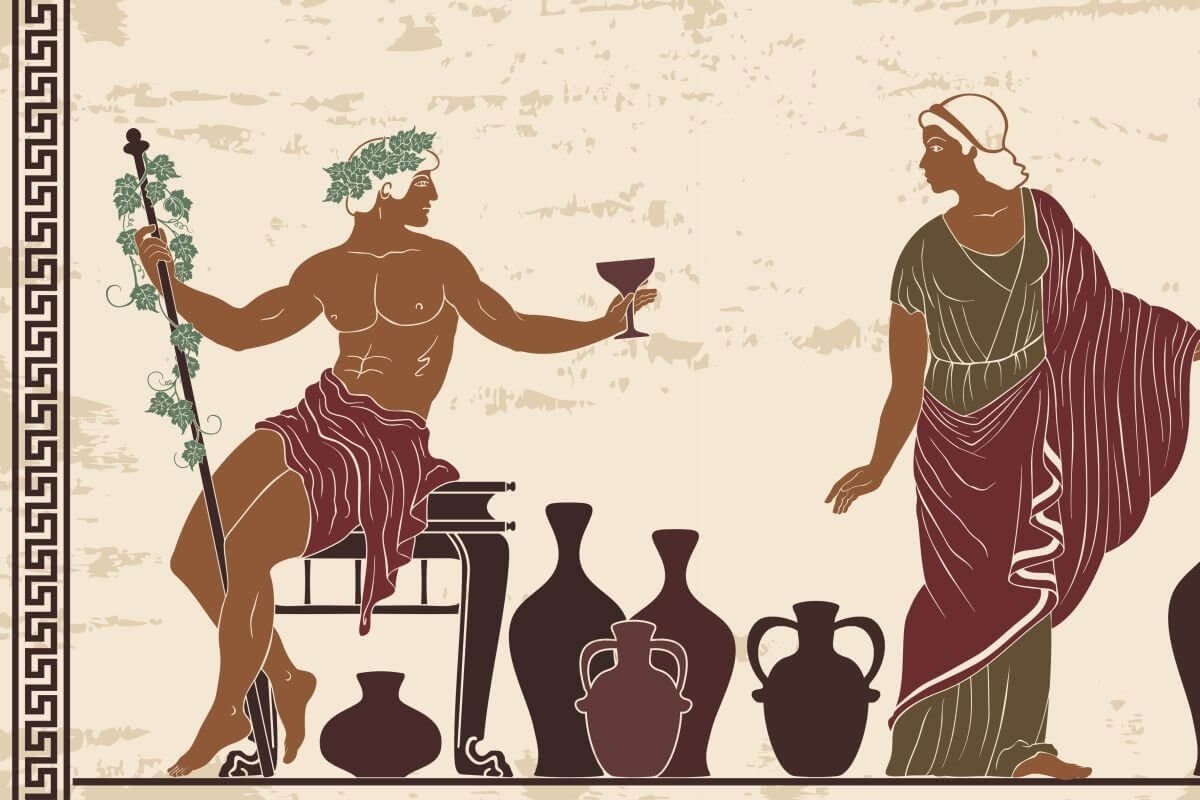
The angry Pentheus ordered to bring him the stranger young man from whom the disaster had come. Therefore, the guards caught Dionysus and brought him before the king. At this point Pentheus went into a rage, wanting to take his revenge upon the foreigner. But suddenly the whole palace shook, as because of an earthquake and on the place where Semele had once perished, a pillar of fire had appeared violently, illuminating the whole place with its strong radiance.
Pentheus, seized by madness, thought that his palace was on fire and ordered to carry water to extinguish it. As for Dionysus, so that he could not escape his worthy punishment, he tried to pierce him with a naked sword. Pentheus thought happily, that he managed to make the mortal blow. Nonetheless by the time when he ran out of the palace he saw Dionysus once again. The god of wine was surrounded by a crowd of bacchantes.
Pentheus becomes a victim of madness
Thereupon Pentheus became more and more lunatic. One of his shepherds arrived from the mountains and told him about the lifestyle of the maenads. The king was enraged and ordered the army to prepare for the march. All the maenads should be captured by force and killed! Pentheus himself decided to disguise as a woman and go to see them in the forest.
However, when he arrived to the woodlands, the maenads distinguished him from the rest and Dionysus pushed the things even further, making them think, that they saw a wild beast. The whole crowd of crazy maidens pounced on the unfortunate man and tore him to pieces.
Agave put the head of Pentheus on her staff and entered the city of Thebes with this booty. She called everyone to look at the head of the fierce lion she thought she had killed. When the madness passed, Agave realized that she committed an awful fiendish crime. Thereafter, she left her native city and died in a foreign land. As for the Thebans, they had forgotten their doubts and prejudices against Dionysus and his mother. Henceforth they considered him to be a real god, and regarded his mother Semele as the mortal wife of Zeus.
